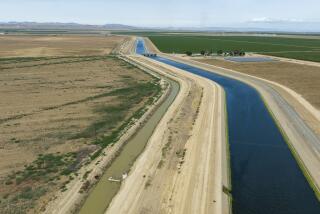House passes bill giving $20 billion to water projects
- Share via
WASHINGTON — Republicans joined Democrats in the often fractious House of Representatives on Wednesday to defy a White House veto threat and approve a massive water bill filled with projects sought by lawmakers for their districts.
The overwhelming 381-40 vote for the popular $20-billion bill -- more than enough to override a veto -- demonstrates the enduring power of earmarking, even though it has figured prominently in congressional scandals.
The bill now goes to the Senate, which is expected to vote on it by the end of the week. It includes more than 900 projects sought by members of both the House and the Senate, including money to revitalize the Los Angeles River and shore up levees in the Sacramento-San Joaquin Delta.
This new confrontation comes as the Republicans in the White House and the Democratic majority in Congress have been at odds over spending levels for the next fiscal year.
But what is different about this fight is that President Bush’s usual allies were among the first to vow to work to override any veto.
During the House debate on Wednesday, Rep. John L. Mica of Florida, the top Republican on the House Transportation and Infrastructure Committee, said: “If we have to override that veto, we need to do that. Our job is to make certain that we build the infrastructure of this country.”
Defending the earmarks, he said, “The people send us here to decide what the priorities are for our districts.” He added that the projects had been scrutinized to ensure they were meritorious.
Similar language came from the top Republican on the Senate Environment and Public Works Committee.
“This bill, while not perfect, has received overwhelming bipartisan support in Congress and goes a long way toward addressing our nation’s water resource needs,” said Sen. James M. Inhofe of Oklahoma.
In threatening that Bush would veto the bill, White House budget director Rob Portman and John Paul Woodley Jr., the Army’s assistant secretary of civil works, objected to the measure’s “excessive spending.”
“It seems a $14-billion Senate bill went into a conference with the House’s $15-billion bill and somehow a bill emerged costing approximately $20 billion,” they said in a letter to lawmakers. “This is not how Americans would expect their representatives in Washington to reach agreement, especially when it is their tax dollars that are being spent.”
The veto threat also put the administration at odds with other usual allies, including the U.S. Chamber of Commerce and farm groups, which support the bill.
Sen. Barbara Boxer (D-Calif.), chairwoman of the Senate Environment and Public Works Committee, predicted that the Senate would override a veto.
“America has been waiting seven years for this bill, which will bring restoration and storm protection to the Gulf Coast in the aftermath of Hurricane Katrina, provide flood control for communities like Sacramento, restore vital wetlands, and maintain the flow of commerce and the jobs that go with it,” she said in a statement.
She included $25 million in the bill for revitalizing the Los Angeles River and an additional $106 million to shore up levees in the Sacramento-San Joaquin Delta.
The bill authorizes projects, but the funding still must be provided through the appropriations process.
The bill is one of the measures that Congress is expected to send the president before lawmakers adjourn this week for a monthlong recess.
In the California delegation, GOP Reps. John Campbell of Irvine, Darrell Issa of Vista, Howard P. “Buck” McKeon of Santa Clarita and Ed Royce of Fullerton joined 37 other Republicans in opposition to the measure. Rep. Bob Filner (D-Chula Vista) did not vote. All others supported the bill.
More to Read
Get the L.A. Times Politics newsletter
Deeply reported insights into legislation, politics and policy from Sacramento, Washington and beyond. In your inbox twice per week.
You may occasionally receive promotional content from the Los Angeles Times.











